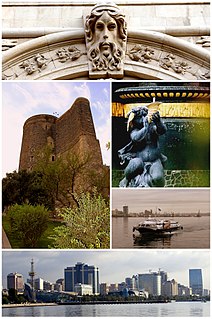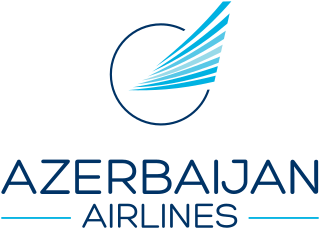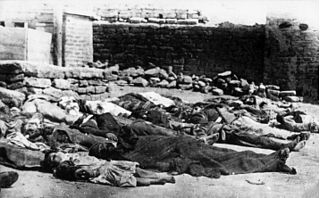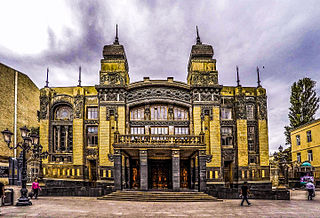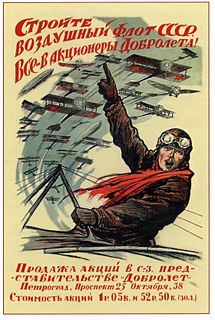Zakavia (Transcaucasian Society of Air Transport, Russian : Закавиа, Закавказское общество воздушных сообщений) was an airline in Georgia and later in Azerbaijan, formed in 1923 and ceased in 1929. Zakavia, created in Georgia on May 10, 1923, [1] was a joint-stock company organized according to the Dobrolyot model. It was one of the three companies organized according to this model in 1923, together with Dobrolyot and Ukrpovitroshliach. Every person or organization could buy Zakavia stocks, and those who owned stocks above a threshold amount could use an airplane built for their money in any way they need unless the airplane was needed for military purposes. [2]

Russian is an East Slavic language, which is official in the Russian Federation, Belarus, Kazakhstan and Kyrgyzstan, as well as being widely used throughout Eastern Europe, the Baltic states, the Caucasus and Central Asia. It was the de facto language of the Soviet Union until its dissolution on 25 December 1991. Although, nowadays, nearly three decades after the breakup of the Soviet Union, Russian is used in official capacity or in public life in all the post-Soviet nation-states, as well as in Israel and Mongolia, the rise of state-specific varieties of this language tends to be strongly denied in Russia, in line with the Russian World ideology.

An airline is a company that provides air transport services for traveling passengers and freight. Airlines utilize aircraft to supply these services and may form partnerships or alliances with other airlines for codeshare agreements. Generally, airline companies are recognized with an air operating certificate or license issued by a governmental aviation body.

Georgia is a country in the Caucasus region of Eurasia. Located at the crossroads of Western Asia and Eastern Europe, it is bounded to the west by the Black Sea, to the north by Russia, to the south by Turkey and Armenia, and to the southeast by Azerbaijan. The capital and largest city is Tbilisi. Georgia covers a territory of 69,700 square kilometres (26,911 sq mi), and its 2017 population is about 3.718 million. Georgia is a unitary semi-presidential republic, with the government elected through a representative democracy.
In 1925, civil aviation of Georgia and Azerbaijan were merged into the united Zakavia society. In 1926, it started to fly between Mineralnye Vody and Tbilisi via Grozny, Makhachkala, Baku, and Yevlakh. [3]
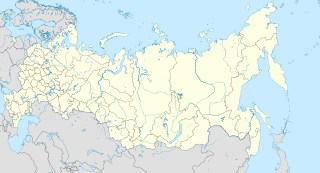
Mineralnye Vody (Min-Vody) is a town in Stavropol Krai, Russia, located along the Kuma River and the main rail line between Rostov-on-Don in Russia and Baku in Azerbaijan. Population: 76,728 (2010 Census); 75,644 (2002 Census); 70,961 (1989 Census).

Tbilisi, in some countries also still known by its pre-1936 international designation Tiflis, is the capital and the largest city of Georgia, lying on the banks of the Kura River with a population of approximately 1.5 million people. Founded in the 5th century AD by Vakhtang I of Iberia, since then Tbilisi served as the capital of various Georgian kingdoms and republics. Between 1801 and 1917, then part of the Russian Empire, Tbilisi was the seat of the Imperial Viceroy, governing both Southern and Northern Caucasus.

Grozny is the capital city of Chechnya, Russia. The city lies on the Sunzha River. According to the 2010 Census, it had a population of 271,573; up from 210,720 recorded in the 2002 Census, but still only about two-thirds of 399,688 recorded in the 1989 Census. It was previously known as Groznaya.
In 1929, Zakavia, together with similar organizations in the Soviet republics, was merged into Dobrolyot USSR, a predecessor of Aeroflot. [2]
PJSC Aeroflot – Russian Airlines, commonly known as Aeroflot, is the flag carrier and largest airline of the Russian Federation. The carrier is an open joint stock company that operates domestic and international passenger and services, mainly from its hub at Sheremetyevo International Airport.

